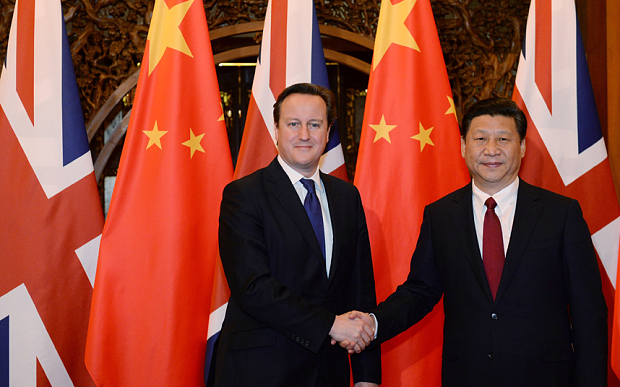
October 29, 2015, by Tony Hong
A Moving Display
By David O’Brien,
Assistant Professor School of the Contemporary Chinese Studies at the University of Nottingham Ningbo.
As President Xi Jinping received the warmest of warm royal welcomes in Britain some eyebrows were raised back in Beijing when a 800 year document limiting the power of the British monarch was quietly moved.
The Magna Carta, signed by King John exactly 800 years ago is currently on a world tour and had been due to be displayed at Beijing’s Renmin University.
However it was then decided to move the display from the university to the official residence of British Ambassador.
“We made the decision to display the Magna Carta at the Residence based on administrative and logistical practicalities,” a spokesman for Britain’s Foreign and Commonwealth Office said.
The copy on display in Beijing is the Hereford Cathedral Magna Carta of 1217, one of only four in existence. Magna Carta went through a number of revisions and reissues before being enshrined in English statute law in 1297. The most significant revision of Magna Carta was issued by Henry III in 1217.
“I would like to take this chance to invite our friends across China to visit this important piece of our cultural heritage during this golden year of U.K.-China relations, and for it to spark further cooperation on rule of law and legal services,” Britain’s ambassador to China, Barbara Woodward said in a news release.
But according to a report in the New York Times it was proving difficult to get to see it. Registration had closed at 9 the night before, and the exhibit was open to the public for only three hours on Wednesday night, according to the embassy’s Chinese-language social media account.
Mark Gill, executive director of the London-based Magna Carta 800th Committee, said the small room at the residence could accommodate only a limited number of people at a time.
Originally issued by King John of England as a solution to the political crisis he faced in 1215, the Magna Carta, meaning ‘The Great Charter’, established for the first time the principle that everybody, including the king, was subject to the law.
During a speech in June marking Magna Carta’s 800th birthday, the UK prime minister, David Cameron, celebrated the text as a symbol of “liberty, justice, democracy [and] the rule of law”.
Of course promoting the rule of law is one of Xi Jinping’s priorities. Soon after becoming leader at an event celebrating the 30th anniversary of the 1982 Chinese Constitution President Xi said:
“We must firmly establish, throughout society, the authority of the Constitution and the law and allow the overwhelming masses to fully believe in the law,” Xi said.
“No organization or individual has the privilege to overstep the Constitution and the law, and any violation of the Constitution and the law must be investigated,” he said.
Last year at the key 4th plenum of the Communist Party Central Committee it was stated most clearly in the communiqué released after the meeting, that the Party’s general target is to form a system serving “the socialist rule of law with Chinese characteristics “and build a country under the “socialist rule of law”.
In an article in The Diplomat in July Peking University academic Chun Peng commented on Chinese Ambassador to the UK Liu Xiaoming delivering a speech in London commemorating the 800th anniversary of Magna Carta.
“Perhaps not by accident, the ambassador avoided such expressions as “human rights” and “liberties,” Peng wrote.
“But he did mention explicitly that the Communist Party itself must be bound by the Constitution and law, which are in turn made by the Chinese people under the leadership of the Communist Party.
“Besides paying homage, he stressed that the Chinese Communist Party is genuinely committed to the core value represented by Magna Carta, the rule of law,” Peng concludes.
It is perhaps then surprising that this most important of historical documents, which has such relevance to the rule of law today is having a rather underwhelming display in Beijing.
No comments yet, fill out a comment to be the first

Leave a Reply